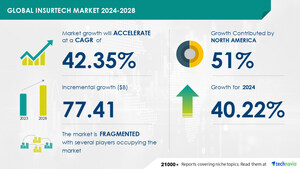NEW YORK, Sept. 11, 2024 /PRNewswire/ -- Report with the AI impact on market trends- The global unmanned maritime systems market size is estimated to grow by USD 9.28 billion from 2024-2028, according to Technavio. The market is estimated to grow at a CAGR of 15.35% during the forecast period. Rising demand for unmanned maritime systems from defense sector is driving market growth, with a trend towards technological advancements in unmanned maritime systems. However, regulatory hurdles in global unmanned maritime systems market poses a challenge .Key market players include BAE Systems Plc, ECA Group, Elbit Systems Ltd., General Dynamics Corp., Hanwha Systems Co., Huntington Ingalls Industries Inc., L3Harris Technologies Inc., Liquid Robotics Inc., Lockheed Martin Corp., Maritime Robotics, Northrop Grumman Corp., Rafael Advanced Defense Systems Ltd., Saab AB, SeaRobotics Corp., Teledyne Technologies Inc., Textron Systems, The Boeing Co., Thales Group, and thyssenkrupp AG.
AI-Powered Market Evolution Insights. Our comprehensive market report ready with the latest trends, growth opportunities, and strategic analysis- View your snapshot now
Forecast period |
2024-2028 |
Base Year |
2023 |
Historic Data |
2018 - 2022 |
Segment Covered |
Type (UUVs, USVs, and UAVs), Technology (Remotely operated vehicle and Autonomous vehicle), and Geography (North America, Europe, APAC, South America, and Middle East and Africa) |
Region Covered |
North America, Europe, APAC, South America, and Middle East and Africa |
Key companies profiled |
BAE Systems Plc, ECA Group, Elbit Systems Ltd., General Dynamics Corp., Hanwha Systems Co., Huntington Ingalls Industries Inc., L3Harris Technologies Inc., Liquid Robotics Inc., Lockheed Martin Corp., Maritime Robotics, Northrop Grumman Corp., Rafael Advanced Defense Systems Ltd., Saab AB, SeaRobotics Corp., Teledyne Technologies Inc., Textron Systems, The Boeing Co., Thales Group, and thyssenkrupp AG |
Key Market Trends Fueling Growth
Unmanned maritime systems (UMS) have experienced significant technological advancements, enhancing their functions and capabilities. These improvements include data processing, communication systems, autonomy, navigation, and sensor integration. UMS can now perform various tasks such as mine countermeasures, oceanographic research, underwater mapping, infrastructure inspection, and communication. Saab AB and Teledyne Technologies Incorporated offer innovative, high-tech, and cost-effective UMS for security and defense, as well as oceanography sensors and vehicles. General Dynamics Corporation provides advanced cyber security solutions for secure real-time data sharing. These advancements are anticipated to fuel the growth of the global unmanned maritime systems market. Saab AB's UMS increase security and defense capabilities, while Teledyne Technologies' offerings collect critical ocean data. General Dynamics ensures secure data sharing, driving market growth.
Unmanned maritime systems, also known as Unmanned Sea Systems or Unmanned Marine Systems, are gaining significant attention in various industries and defense sectors. These systems, which include Unmanned Surface Vehicles (USVs) and Unmanned Underwater Vehicles (UUVs), are revolutionizing maritime surveillance, naval forces, and national security. Key trends include remote recharge capabilities and autonomous features for extended operational duration. USVs and UUVs are used for maritime intelligence, surveillance, reconnaissance, and defense missions. They help combat illegal immigration, smuggling, piracy, and other threats to national security. The defense industry is investing heavily in these systems for military applications, with a focus on stealth platforms, acoustic sensors, imaging sensors, and autonomous features. The market for unmanned maritime systems is expected to grow due to increasing defense spending and the need for advanced surveillance capacity in remote areas. Service providers and payload suppliers are also playing a crucial role in the market's growth. However, manufacturing delays and budget constraints may impact the market's growth. Additionally, unmanned maritime systems are being used for scientific research, ocean cleaning, and distribution networks. The future of unmanned maritime systems lies in advanced autonomous technologies, combat techniques, and communication capabilities.
Insights on how AI is driving innovation, efficiency, and market growth- Request Sample!
- The unmanned maritime systems market faces complex regulatory challenges, impacting its growth. Regulations focus on safety, environmental impact, and operational protocols, requiring significant investments in compliance. Regional differences add complexity, with varying safety and liability requirements. Environmental regulations restrict UMS use in certain areas, limiting operational scope. International maritime law complicates operations, particularly in territorial waters and Exclusive Economic Zones. Obtaining permits and certifications involves lengthy approval processes, delaying technology deployment and market response. These regulatory hurdles may hinder the growth of the global unmanned maritime systems market.
- The Unmanned Maritime Systems Market is experiencing significant growth due to increasing demand for maritime intelligence, surveillance, and reconnaissance. Acoustic and imaging sensors are key components, enabling detection of submarines and identification of objects at sea. Autonomous features enhance operational capabilities, reducing reliance on human crews. Defense spending on unmanned systems is increasing for national defense and surveillance missions. Naval agencies and service providers require advanced payloads and communication capabilities for remote areas. Challenges include manufacturing delays, defense budget constraints, and ethical concerns. Piracy, international terrorism, and protection of ports and exclusive economic zones are primary applications. Unmanned Underwater, Surface, and Autonomous Underwater Vehicles are essential naval platforms. Ethical concerns and communication signals are important considerations for this market.
Insights into how AI is reshaping industries and driving growth- Download a Sample Report
This unmanned maritime systems market report extensively covers market segmentation by
- Type
- 1.1 UUVs
- 1.2 USVs
- 1.3 UAVs
- Technology
- 2.1 Remotely operated vehicle
- 2.2 Autonomous vehicle
- Geography
- 3.1 North America
- 3.2 Europe
- 3.3 APAC
- 3.4 South America
- 3.5 Middle East and Africa
1.1 UUVs- Unmanned underwater vehicles (UUVs) are autonomous underwater systems designed for submerged missions without human intervention. Equipped with onboard sensors and software, UUVs navigate and complete tasks independently. UUVs find applications in seafloor mapping, pipeline inspections, environmental monitoring, and military operations. The demand for advanced underwater technology solutions and underwater research investments fuel market growth. UUVs offer naval agencies extended operational reach and discrete capabilities with minimal risk to manned assets. Continuous technology advancements enable multiple UUV deployments from a single platform, expanding sensor networks for real-time data collection. UUVs are also gaining traction in commercial sectors like offshore oil and gas, renewable energy, and infrastructure inspections. Applications include deep-sea exploration, environmental monitoring, underwater infrastructure inspections, marine research, and military surveillance, enhancing data collection and operational efficiency in challenging underwater conditions. The expanding UUV usage across various sectors is expected to drive the growth of the global unmanned maritime systems market.
Download complimentary Sample Report to gain insights into AI's impact on market dynamics, emerging trends, and future opportunities- including forecast (2024-2028) and historic data (2018 - 2022)
Unmanned Maritime Systems, also known as Unmanned Sea Systems, refer to autonomous or remotely operated vehicles and technologies designed for maritime applications. These systems play a crucial role in various sectors including maritime surveillance, naval forces, and national security. They are used for tasks such as illegal immigration and smuggling detection, fisheries protection, and piracy prevention. Autonomous capabilities and remote recharge capabilities enable these systems to operate for extended periods, making them ideal for surveillance missions. Naval agencies and service providers leverage Unmanned Maritime Systems for securing ports, protecting Exclusive Economic Zones, and countering international terrorism. Payload suppliers and manufacturing delays are key challenges in the market. Unmanned Underwater Vehicles (UUVs), Unmanned Surface Vehicles (USVs), and Autonomous Underwater Vehicles (AUVs) are essential components of Unmanned Maritime Systems. The market is driven by the need for maritime security, naval defense, international trade, and ports protection. Unmanned vehicles are also used for surveillance applications in various industries, including oil and gas, renewable energy, and scientific research. Manufacturing delays and defense budget constraints are major challenges for the market. Autonomous technologies are expected to revolutionize the industry by enabling advanced capabilities and reducing operational costs.
Unmanned Maritime Systems, also known as Unmanned Sea Systems, refer to autonomous and remotely operated vehicles used in maritime applications. These systems include Unmanned Surface Vehicles (USVs), Unmanned Underwater Vehicles (UUVs), and Autonomous Underwater Vehicles (AUVs). They are utilized for various purposes such as maritime surveillance, naval forces support, illegal immigration and smuggling detection, fisheries protection, and national security. Unmanned maritime systems offer remote recharge capabilities and autonomous features, making them ideal for operations in remote areas and harsh environments. They are equipped with acoustic sensors, imaging sensors, and autonomous features for maritime intelligence, surveillance, reconnaissance, defense spending, scientific research, and defense. The market for unmanned maritime systems is driven by the need for enhanced maritime security, defense, and surveillance capabilities. Applications include piracy prevention, ports protection, international trade security, and protection of Exclusive Economic Zones. Ethical concerns and manufacturing delays are challenges in the market. The defense industry and service providers are key stakeholders, along with payload suppliers and communication capabilities providers. The market also includes autonomous technologies, combat techniques, and distribution networks. Unmanned maritime systems have significant potential for ocean cleaning and international terrorism prevention.
1 Executive Summary
2 Market Landscape
3 Market Sizing
4 Historic Market Size
5 Five Forces Analysis
6 Market Segmentation
- Type
- UUVs
- USVs
- UAVs
- Technology
- Remotely Operated Vehicle
- Autonomous Vehicle
- Geography
- North America
- Europe
- APAC
- South America
- Middle East And Africa
7 Customer Landscape
8 Geographic Landscape
9 Drivers, Challenges, and Trends
10 Company Landscape
11 Company Analysis
12 Appendix
Technavio is a leading global technology research and advisory company. Their research and analysis focuses on emerging market trends and provides actionable insights to help businesses identify market opportunities and develop effective strategies to optimize their market positions.
With over 500 specialized analysts, Technavio's report library consists of more than 17,000 reports and counting, covering 800 technologies, spanning across 50 countries. Their client base consists of enterprises of all sizes, including more than 100 Fortune 500 companies. This growing client base relies on Technavio's comprehensive coverage, extensive research, and actionable market insights to identify opportunities in existing and potential markets and assess their competitive positions within changing market scenarios.
Technavio Research
Jesse Maida
Media & Marketing Executive
US: +1 844 364 1100
UK: +44 203 893 3200
Email: [email protected]
Website: www.technavio.com/
SOURCE Technavio

WANT YOUR COMPANY'S NEWS FEATURED ON PRNEWSWIRE.COM?
Newsrooms &
Influencers
Digital Media
Outlets
Journalists
Opted In





Share this article